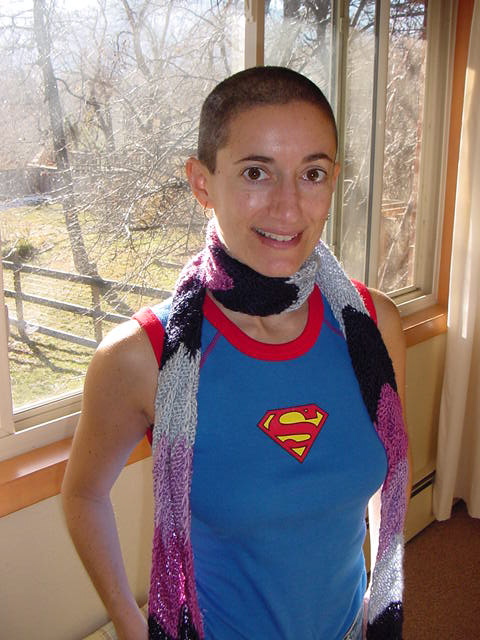

Laura Kupperman, yoga instructor and Cinco Vidas expert, says yoga class eased her chemo side effects and helped her recover quickly from a mastectomy.
“A few years ago,” says survivor Dana, “when I found a lump on my breast, I felt so disconnected to my body. How could it betray me like this?”
“It’s weird,” says fighter Debi. “I feel as though my rational brain is disconnected from my body, because although I know in the end that I will be fine, my body is shaky and scared.”
It’s a common feeling among cancer patients: disjointed, disconnected, betrayed by the body. For decades this complex mass of organic material has taken you where you needed to go, and performed according to your commands. Suddenly, something’s wrong. It’s not a virus, nor bacteria that have invaded your hallowed walls. It’s your own cells, turning on you.
“Cancer can often cause a unique sense of separation between self and body,” says author Laurie Wertich, “as patients ‘fight’ their cancer….Ironically, they are fighting themselves. Yoga is a way to bridge this gap, to ease this sense of separation and to embrace the whole self.”
In fact, the word “yoga” means “union,” which most western practitioners take to mean the union of the mind, body, and spirit. There is the physical exercise component, which Laura Kupperman-breast-cancer survivor, yoga instructor, and Cinco Vidas expert-credits for her fast recovery after a bilateral mastectomy. “During my first class, I could barely move,” she says. “After only a few classes, my body was totally different.”
Those who haven’t tried yoga may believe the physical postures too difficult, but the whole philosophy is to do only what feels right and to listen to the body. “When people understand what yoga is,” says yoga therapist Jnani Chapman, “there is no time that a person can’t do yoga, even when they have cancer.” In fact, studies have shown that yoga can improve circulation, digestion, sleep patterns, mobility, strength, and relaxation, plus ease side effects like nausea, joint pain, and fatigue.
But for many cancer patients, it’s the mystical benefits to the mind and spirit that make yoga so valuable during and after treatment. According to womenfitness.net, “As we engage our physical selves in the precise body gestures of yoga, our minds come along, growing accustomed to focusing on the affairs of this movement and leaving worries and future-thinking behind. As we breathe and meditate, our minds grow more clear and steady.”
Part of this benefit comes from the deep-breathing technique. Considered the life force in yoga, the breath is meant to expand the belly, rib cage, and chest, which creates a true, full breath. Most adults breathe more shallowly, from the chest only, which delivers less life-giving oxygen to the body. Breathing more deeply improves respiration, and encourages clarity and calm-something cancer patients desperately need. “Because yoga has specific breathing technique,” says survivor and writer Jennifer Weiss, “it can help patients focus their attention and fight off the depressive intrusive thoughts and focus more on relaxing. It sure helped with me.”
In the end, you just have to experience it to know how yoga can help you. “I consider yoga class a life-saver,” says survivor Ann Getzoff. “When I was sickest from the treatments, yoga was the one steady thing I could do, no matter what.”
Virginia, a student of Kupperman’s, was so sold on yoga as a treatment adjunct that she wishes she had started it sooner. “I really wish I had gone to yoga when I was in treatment. That would be my advice to someone going through cancer or chemo.”
If you’re looking for a yoga class in your area, Kupperman suggests looking for one specifically designed for cancer patients and survivors. (Try yogafinder.com.) If you don’t have one, look for a restorative or beginner’s class.

